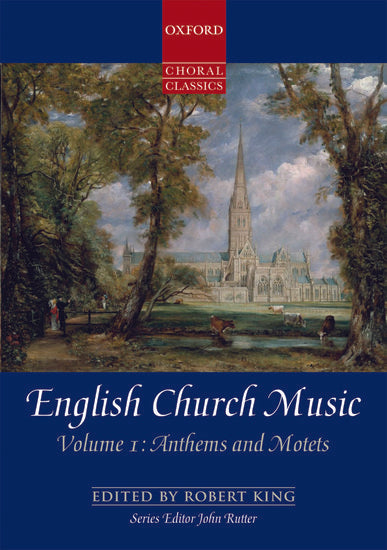English Church Music - Volume 1: Anthems and Motets
Expected to ship in 1-2 weeks.
- Composers: Thomas Tallis (1505-1585), Herbert Howells (1892-1983), John Taverner (1490-1545), Robert Parsons, Ralph Vaughan Williams (1872-1958), Orlando Gibbons (1583-1625), John Goss (1800-1880), Edward Elgar (1857-1934), Thomas Morley (1557-1602), William Boyce (1711-1779), Peter Philips (1560-1628), Edward Bairstow (1874-1946), John Stainer (1840-1901), William Byrd (1539-1623), Thomas Tomkins (1572-1656), John Ireland (1879-1962), Samuel Sebastian Wesley (1810-1876), Felix Mendelssohn (1809-1847), John Blow (1649-1708), William Walton (1902-1983), Maurice Greene (1696-1755), Charles Villiers Stanford (1852-1924)
- Instrumentation: Organ, SATB Choir
- Work Language: English
- ISBN:
- Size: 7.5 x 10.6 inches
- Pages: 384
Listen
Description
English Church Music assembles in two volumes around 100 of the finest examples of English sacred choral music of the past five centuries. The first volume, dedicated to anthems and motets, presents both favorite and lesser-known works.
- Anon.: Rejoice in the Lord alway
- Bairstow: Jesu, the very thought of thee
- Blow: Salvator mundi
- Boyce: O where shall wisdom be found?
- Byrd: Ave verum Corpus
- Byrd: Haec dies
- Byrd: Justorum animae
- Byrd: Sing joyfully
- Elgar: They are at rest
- Farrant or Hilton: Lord, for thy tender mercy's sake
- Gibbons: O clap your hands
- Gibbons: O Lord, in thy wrath
- Goss: These are they which follow the Lamb
- Greene: Lord, let me know mine end
- Hadley: My song is love unknown
- Harris: Faire is the heaven
- Harwood: O how glorious is the kingdom
- Howells: Like as the hart desireth the waterbrooks
- Ireland: Greater love hath no man
- Lewis: The souls of the righteous
- Mendelssohn: Hear my prayer
- Morley: Nolo mortem peccatoris
- Naylor: Vox dicentis: Clama
- Parsons: Ave Maria
- Philips: Ascendit Deus
- Purcell: Hear my prayer, O Lord
- Purcell: I was glad when they said unto me
- Purcell: Let mine eyes run down with tears
- Purcell: Lord, how long wilt thou be angry?
- Purcell : Remember not, Lord, our offences
- Stainer: God so loved the world
- Stainer: I saw the Lord
- Stanford: Beati quorum via
- Stanford: Coelos ascendit hodie
- Stanford: How beauteous are their feet
- Stanford: I heard a voice from heaven
- Stanford: Justorum animae
- Tallis: If ye love me
- Tallis: Loquebantur variis linguis
- Tallis: O Lord, give thy Holy Spirit
- Tallis: O nata lux de lumine
- Taverner: Dum transisset Sabbatum
- Tomkins: When David heard
- Vaughan Williams: O how amiable
- Vaughan Williams: O taste and see
- Walton: Set me as a seal upon thine heart
- Wesley: Blessed be the God and Father
- Wesley: Praise the Lord, O my soul
- Wesley: Thou wilt keep him in perfect peace
- Wesley: Wash me throughly
- Wood: O thou the central orb
Publishers use a lot of words to describe what they sell, and we know it can be confusing. We've tried to be as clear as possible to make sure you get exactly what you are looking for. Below are descriptions of the terms that we use to describe the various formats that music often comes in.
Choral Score
A score for vocalists that only contains the vocal lines. The instrumental parts are not there for reference. Generally, cheaper than a vocal score and requires multiple copies for purchase.
Facsimile
Reproductions of the original hand-written scores from the composer.
Full Score
For ensemble music, this indicates that the edition contains all parts on a single system (there are not separate parts for each player). In larger ensembles, this is for the conductor.
Hardcover
Hardbound. Generally either linen-covered or half-leather.
Orchestral Parts
Similar to a wind set, this is a collection of parts. In the case of strings, the numbers listed are the number of copies included, though generally these are available individually (often with minimum quantities required).
Paperback
When publishers offer multiple bindings (e.g. hardcover) or study scores, this is the "standard" version. If you're planning to play the music, this is probably what you want.
Performance / Playing Score
A score of the music containing all parts on one system, intended for players to share. There are not separate parts for each player.
Set of Parts
For ensemble music, this indicates that there are separate individual parts for each player.
Solo Part with Piano Reduction
For solo pieces with orchestra, this is a version that contains a piano reduction of the orchestra parts. For piano pieces, two copies are typically needed for performance.
Study Score
A small (think choral size) copy of the complete score meant for studying, and not playing. They make great add-ons when learning concertos and small chamber works.
Vocal Score
A score prepared for vocalists that includes the piano/organ part or a reduction of the instrumental parts.
Wind Set
For orchestral music, this is a collection of wind and percussion parts. The specific quantities of each instrument are notated.
With Audio
In addition to the printed music, the edition contains recordings of the pieces. This may be an included CD, or access to files on the internet.
With / Without Fingering (Markings)
Some publishers prepare two copies - a pure Urtext edition that includes no fingering (or bowing) suggestions and a lightly edited version that includes a minimal number of editorial markings.


